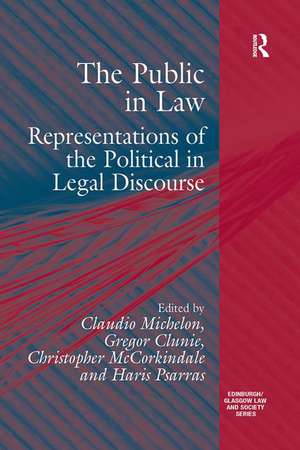The Public in Law: Representations of the Political in Legal Discourse
Autor Gregor Clunie Editat de Claudio Michelon Autor Haris Psarrasen Limba Engleză Paperback – 9 sep 2016
| Toate formatele și edițiile | Preț | Express |
|---|---|---|
| Paperback (1) | 469.34 lei 6-8 săpt. | |
| Taylor & Francis – 9 sep 2016 | 469.34 lei 6-8 săpt. | |
| Hardback (1) | 1060.74 lei 6-8 săpt. | |
| Taylor & Francis – 28 dec 2011 | 1060.74 lei 6-8 săpt. |
Preț: 469.34 lei
Nou
Puncte Express: 704
Preț estimativ în valută:
89.81€ • 97.86$ • 75.68£
89.81€ • 97.86$ • 75.68£
Carte tipărită la comandă
Livrare economică 23 aprilie-07 mai
Preluare comenzi: 021 569.72.76
Specificații
ISBN-13: 9781138273962
ISBN-10: 1138273961
Pagini: 320
Dimensiuni: 156 x 234 x 17 mm
Greutate: 0.45 kg
Ediția:1
Editura: Taylor & Francis
Colecția Routledge
Locul publicării:Oxford, United Kingdom
ISBN-10: 1138273961
Pagini: 320
Dimensiuni: 156 x 234 x 17 mm
Greutate: 0.45 kg
Ediția:1
Editura: Taylor & Francis
Colecția Routledge
Locul publicării:Oxford, United Kingdom
Cuprins
Contents: Editors' introduction; On the necessarily public character of law, Neil Walker. Part I Constituted Publics: Rediscovering ’the public’: the curious case of Benjamin Constant, Christopher McCorkindale; Democracy, political parties and the will of the people, Andrew Maloney; Between contract and constitution: international organizations and the protection of global public interests, Richard Collins. Part II Unconstituted Publics: 'Unconstituted publics'?, Scott Veitch; A dilemma for the civil disobedient: pleading 'guilty' or 'not guilty' in the courtroom?, Piero Moraro; Justifying civil disobedience with reference to EU public consensus, Haris Psarras. Part III Excluded Publics: Excluded publics - included privates: the Janus-headed nature of the liberal public-private divide, Daniel Augenstein; The prisoner's right to vote: the creation of an abnormal and excluded public, Vanessa De Greef; Subjects to citizens: 'native' enfranchisement in reconstituting the imperial public of the British Empire c. 1887-1914, Coel Kirkby. Part IV Public/Private: The public/private dichotomy and the unity of capitalist (re-)production, Gregor Clunie; The public nature of private law, Claudio Michelon; Between the public and the private: banking law in 1830s England, Iain Frame; The public-ness of development in the World Trade Organisation, Stephanie Switzer. Part V Emerging Publics: the Role of the Victim in International Criminal Justice: The impact of the distinction between situations and cases on the participation of victims in the International Criminal Court, Ania Salinas and James Sloan; Addressing the interests of victims: perspectives from the office of the prosecutor, Olivia Swaak-Goldman; Victims' access to the International Criminal Court: much remains to be done, Gilbert Bitti and Leïla Bourguiba; Index.
Notă biografică
Claudio Michelon is Lecturer in Law, University of Edinburgh. He was previously Adjunct Professor, Federal University of Rio Grande do Sul (Brazil). He is Secretary-General of the International Association for Philosophy of Law and Social Philosophy and President of the Brazilian Institute for Legal Philosophy (IBFD). Gregor Clunie is a PhD Candidate, University of Glasgow. Christopher McCorkindale is Lecturer in Law, Glasgow Caledonian University. His recent publications include a book on `The Legal Thought of Hannah Arendt'. Haris Psarras is a Tutor in Jurisprudence and in Legal Reasoning & Legal System, School of Law, University of Edinburgh. He is also Attorney at Law, Athens Bar.
Descriere
This collection brings together a group of scholars to discuss the operation of ' the public' in a range of different legal, illegal and alegal spaces. It asks whether and in what manner ' the public' operates as an interface between law and society. This volume reflects an understanding that there is more to the role of 'the public' in relation to law than the conventional demarcation of the field of 'public law' and that this relationship is open to comment from a wide range of actors.
